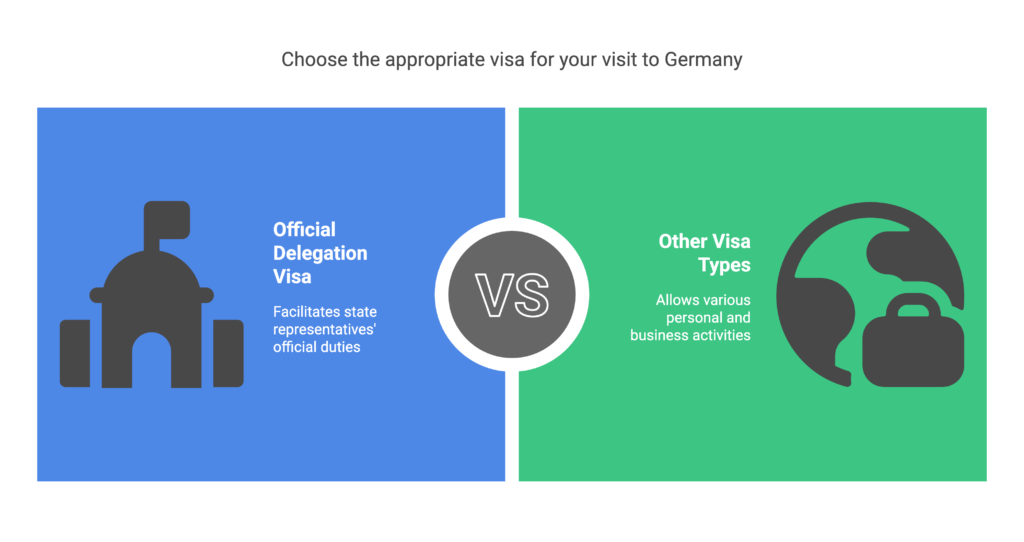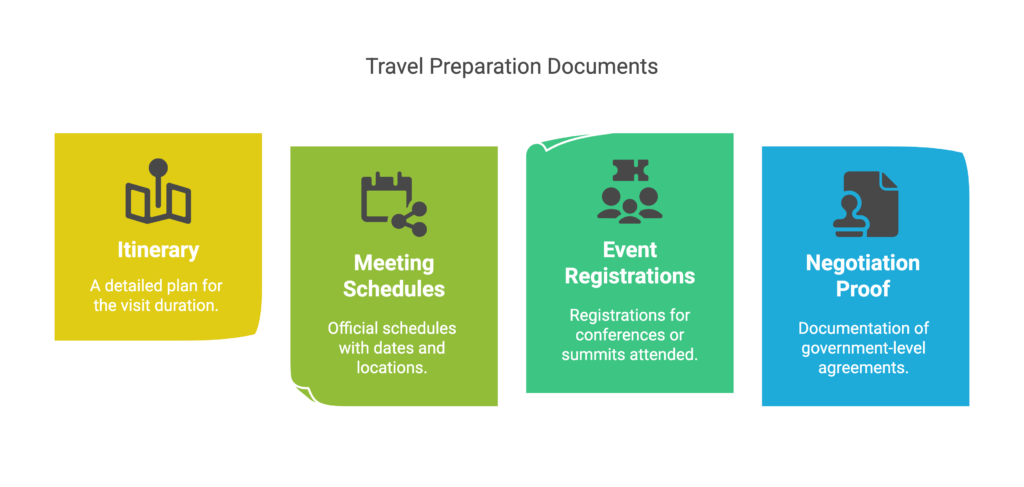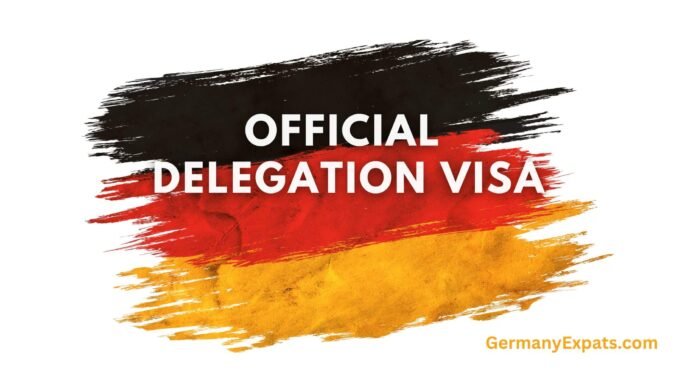Germany Official delegation Visa is important in international relations. It helps countries work together in diplomatic, economic, and cultural areas. These groups consist of government representatives and professionals who travel abroad for official events, such as summits, conferences, trade talks, or discussions between countries. Germany, as a leading country in the global economy and politics, often hosts these delegations. This makes the German Official Delegation Visa an important category for those attending state-sanctioned events.
This article helps individuals and government officials apply for an Official Delegation Visa for Germany. It explains the eligibility requirements and the application process. This guide ensures you have a smooth and informed experience when applying.
Having accurate and current information is crucial since visa rules and processes can change. A well-prepared application helps avoid delays, meets German laws, and lets the delegation focus on their official work without administrative issues. This guide offers clear, step-by-step advice to help you easily navigate the process.
Understanding the Official Delegation Visa
A Germany Official Delegation Visa is a short-stay Schengen visa (Type C) for people traveling to Germany as part of a government delegation. This visa is for government officials, diplomats, members of parliament, representatives of public institutions, and professionals invited to official events. It allows entry into Germany for state meetings, negotiations, international conferences, intergovernmental discussions, or official events hosted by German authorities or institutions.
Unlike business or tourist visas, which cater to private individuals, this visa is strictly for state-sponsored trips. The applicant must be part of a recognized official delegation, and their purpose of travel should align with diplomatic or government-related activities.
Key Differences from Other Visa Types

The Official Delegation Visa follows a distinct process compared to other visa categories. Unlike a business visa, which allows corporate professionals to attend trade fairs or private meetings, this visa is exclusively granted to state representatives on official duty. A tourist visa, on the other hand, is for leisure travel and does not grant permission to engage in government-related meetings.
To apply, you need an official invitation from a German government agency or an international organization in Germany. You will also need documents that prove your official role and explain the purpose of your visit.
The processing time and benefits of this visa vary. Since it relates to state affairs, applications may be processed faster, and holders might have special entry procedures when arriving in Germany. However, this visa does not provide automatic diplomatic immunity, which is only for official diplomatic visas (Type A or Type D).
Legal Framework
The process for getting Official Delegation Visas follows the Schengen Visa Regulation (EC) No. 810/2009, which covers short-stay visas for the Schengen Area, including Germany. Germany’s Residence Act (Aufenthaltsgesetz) also specifies conditions for foreign officials entering the country for government-related activities.
You can apply for a visa at German embassies or consulates in your home country. The German Foreign Office and other federal ministries manage the visa approval process. They check that each applicant meets the requirements for official delegation status and that the visit has a valid government-related purpose.
Eligibility Requirements for a Germany Official Delegation Visa
To qualify for a Germany Official Delegation Visa, applicants must meet specific criteria that verify their official status, the purpose of their visit, and their travel documentation. Since this visa is granted strictly for state-related activities, every application must be supported by strong official evidence.
Official Status
Applicants must prove that they are traveling as part of an official government delegation. This requires:
- An official letter from their home country’s government or institution confirming their position, role, and purpose of travel.
- A formal invitation from the German government, a German ministry, or an international organization based in Germany specifying the official event, meeting, or negotiation they will attend.
- If applicable, proof of diplomatic rank or government employment, such as an official ID or designation certificate.
Purpose of Visit
The visa application must clearly establish the reason for travel, ensuring it aligns with state affairs. Required documents include:

- A detailed itinerary covering the entire duration of the visit.
- Official meeting schedules with dates, locations, and the names of German counterparts.
- Conference or event registrations (if attending an intergovernmental conference or summit).
- Proof of government-level negotiations or agreements, if applicable.
Passport and Travel Documents
Applicants must submit valid travel documents that meet German visa regulations:
- A valid passport with at least two blank pages and a minimum validity of three months beyond the planned departure date.
- Copies of previous visas, if applicable, to show past travel history.
- Certified translations of key documents (if they are not in German or English).
Other Requirements
- Health Insurance: In some cases, applicants may be asked to provide proof of valid health insurance covering medical expenses during their stay in Germany. This is usually waived for high-ranking officials but may be required for accompanying staff.
- Financial Proof: While the sending government covers most expenses, in certain cases, proof of sufficient funds may be necessary to demonstrate financial stability during the visit.
- No Criminal Record: While not always explicitly required, applicants should not have any outstanding legal issues that could affect their eligibility.
Meeting these requirements ensures a smooth visa application process, reducing the likelihood of delays or rejections.
Duration of Stay
Like other Schengen visas, the Germany Official Delegation Visa allows you to stay for up to 90 days within a 180-day period. If the delegation needs to stay longer than this, they might require a National Visa (Category D), but this is not common.
Visa Fees and Waivers
The standard Schengen visa fee is EUR 90, while the National Visa fee is EUR 75. However, Germany has visa facilitation agreements with certain countries under which official delegation members may be eligible for a fee waiver. You should check with your country’s German consulate or embassy to confirm whether you qualify for such exemptions.
Application Process
For the most accurate and current information about applying for a Germany Official Delegation Visa, please visit the German Federal Foreign Office’s official website: https://www.auswaertiges-amt.de/en/visa-service/215870-215870. This site gives you the latest visa requirements, application steps, and any changes in rules that may affect your application.
Our guide helps you understand what you need to know before applying. While the official website provides step-by-step instructions, we offer extra insights on eligibility, required documents, and key points to ease your application process. This way, you are ready before you start, which helps avoid delays and keeps you in line with German regulations.
Visa Type and Conditions
The Germany Official Delegation Visa is typically issued as a Schengen Visa (Category C), allowing stays of up to 90 days. If a delegation member requires a more extended stay, they must obtain a National Visa (Category D) before arriving in Germany.
It is important to note that this visa does not allow the holder to engage in any work or study activities outside the official delegation visit.
Additional Considerations

- Ensure all documents are translated into German or English if required.
- Double-check the validity of your passport and the correctness of the information provided in your application.
- Be aware of peak processing times and apply well in advance.
- In case of visa rejection, applicants can appeal the decision or reapply with additional supporting documents.
Conclusion
The Germany Official Delegation Visa is an important document for government officials, diplomats, and representatives visiting Germany for official meetings, conferences, or negotiations. This visa is different from business or tourist visas. To apply, you need to prove your official status, provide a formal invitation, and submit a detailed itinerary that explains the purpose of your trip. Knowing the eligibility requirements, necessary documents, and legal guidelines will help you navigate the application process smoothly.
Follow the correct procedures to avoid delays or rejections. Visa rules can change, so always check the official German Foreign Office website (https://www.auswaertiges-amt.de/en/visa-service/215870-215870) for the latest updates. Make sure your application meets all requirements. This way, you can focus on your official duties without any administrative issues. Proper preparation is key for a successful and stress-free visit to Germany.

